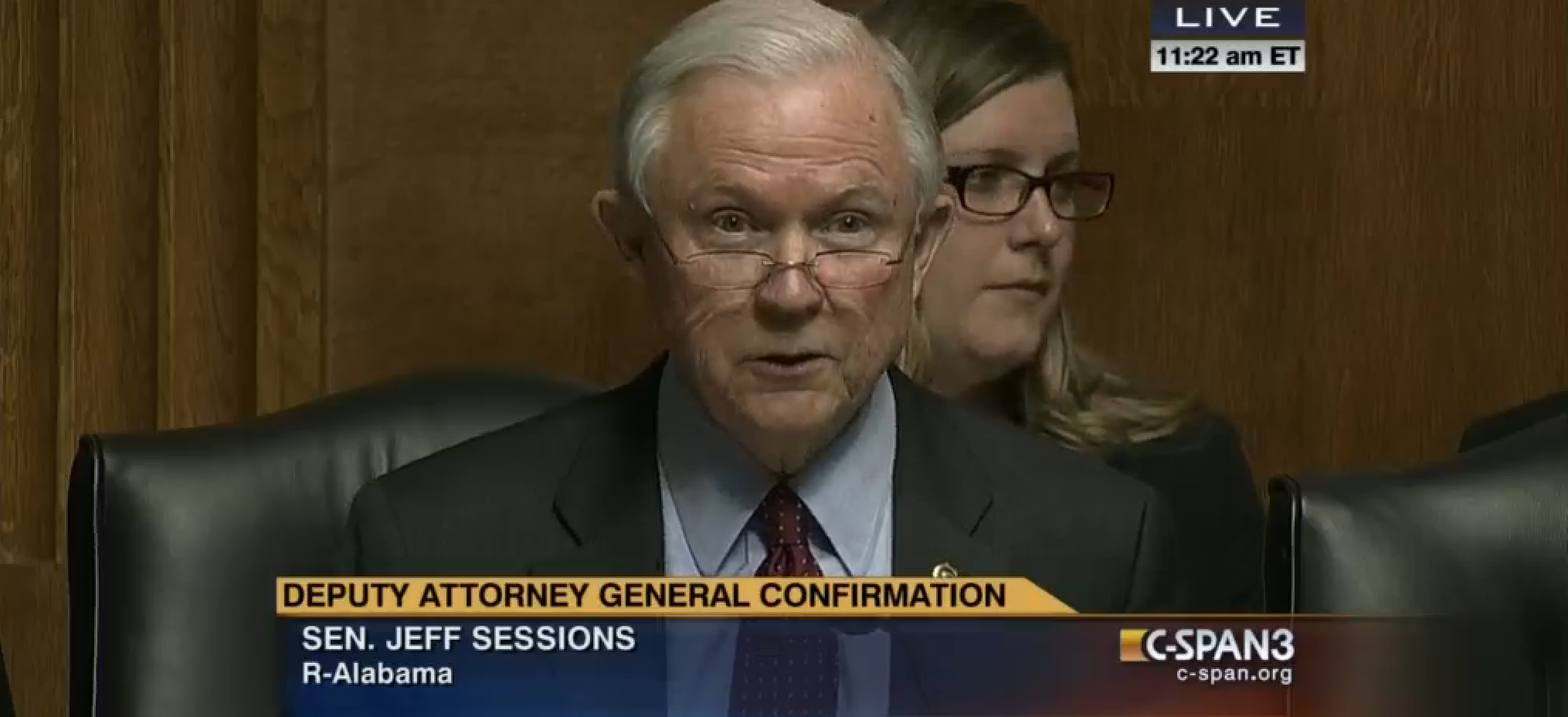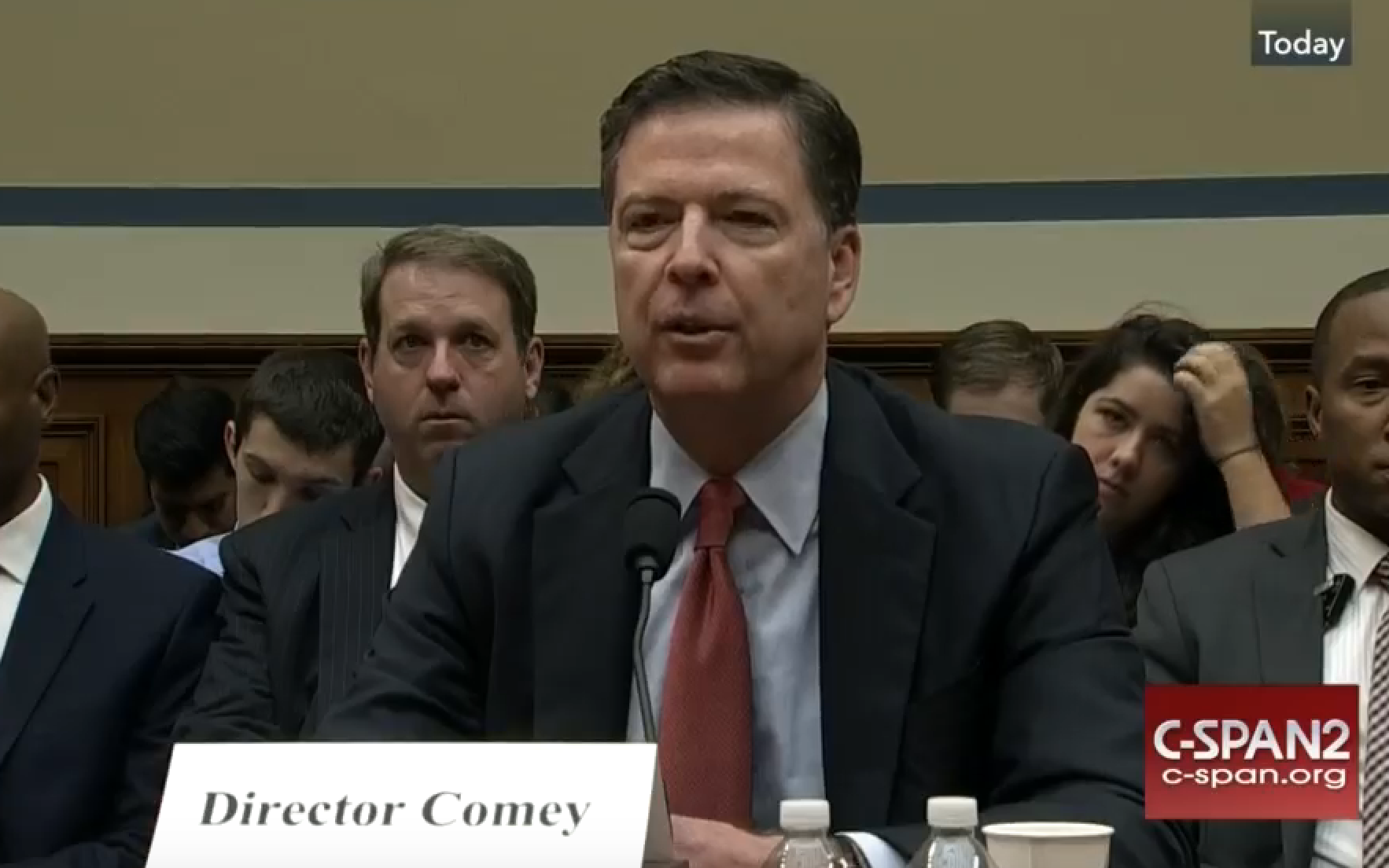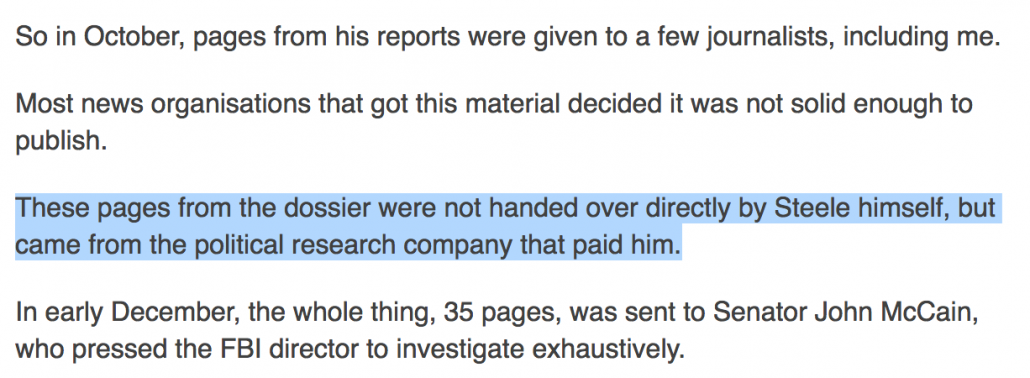The Senate Judiciary Committee had an oversight hearing with Jim Comey yesterday, which I live-tweeted in great depth. As you can imagine, most of the questions pertained either to Comey’s handing of the Hillary investigation and/or to the investigation into Russian interference in the election. So much so that The Hill, in its “Five Takeaways from Comey’s testimony,” described only things that had to do with the election:
- Comey isn’t sorry (but he was “mildly nauseous” that his conduct may have affected the outcome)
- Emotions over the election are still raw
- Comey explains DOJ dynamic: “I hope someday you’ll understand”
- The FBI may be investigating internal leaks
- Trump, Clinton investigations are dominating FBI oversight
The Hill’s description of that third bullet doesn’t even include the “news” from Comey’s statement: that there is some still-classified detail, in addition to Loretta Lynch’s tarmac meeting with Bill Clinton and the intercepted Hillary aide email saying Lynch would make sure nothing happened with the investigation, that led Comey to believe he had to take the lead on the non-indictment in July.
I struggled as we got closer to the end of it with the — a number things had gone on, some of which I can’t talk about yet, that made me worry that the department leadership could not credibly complete the investigation and declined prosecution without grievous damage to the American people’s confidence in the — in the justice system.
As I said, it is true that most questions pertained to Hillary’s emails or Russia. Still, reports like this, read primarily by people on the Hill, has the effect of self-fulfilling prophecy by obscuring what little real oversight happened. So here’s my list of five pieces of actual oversight that happened.
Neither Grassley nor Feinstein understand how FISA back door searches work
While they primarily focused on the import of reauthorizing Section 702 (and pretended that there were no interim options between clean reauthorization and a lapse), SJC Chair Chuck Grassley and SJC Ranking Member Dianne Feinstein both said things that made it clear they didn’t understand how FISA back door searches work.
At one point, in a discussion of the leaks about Mike Flynn’s conversation with Sergey Kislyak, Grassley tried to suggest that only a few people at FBI would have access to the unmasked identity in those intercepts.
There are several senior FBI officials who would’ve had access to the classified information that was leaked, including yourself and the deputy director.
He appeared unaware that as soon as the FBI started focusing on either Kislyak or Flynn, a back door search on the FISA content would return those conversations in unmasked form, which would mean a significant number of FBI Agents (and anyone else on that task force) would have access to the information that was leaked.
Likewise, at one point Feinstein was leading Comey through a discussion of why they needed to have easy back door access to communication content collected without a warrant (so we don’t stovepipe anything, Comey said), she said, “so you are not unmasking the data,” as if data obtained through a back door search would be masked, which genuinely (and rightly) confused Comey.
FEINSTEIN: So you are not masking the data — unmasking the data?
COMEY: I’m not sure what that means in this context.
It’s raw data. It would not be masked. That Feinstein, who has been a chief overseer of this program for the entire time back door searches were permitted doesn’t know this, that she repeatedly led the effort to defeat efforts to close the back door loophole, and that she doesn’t know what it means that this is raw data is unbelievably damning.
Incidentally, as part of the exchange wit Feinstein, Comey said the FISA data sits in a cloud type environment.
Comey claims the government doesn’t need the foreign government certificate except to target spies
Several hours into the hearing, Mike Lee asked some questions about surveillance. In particular, he asked if the targeting certificates for 702 ever targeted someone abroad for purposes unrelated to national security. Comey seemingly listed off the certificates we do have — foreign government, counterterrorism, and counterproliferation, noting that cyber gets worked into other ones.
LEE: Yes. Let’s talk about Section 702, for a minute. Section 702 of the Foreign Intelligence Surveillance Amendments Act authorizes the surveillance, the use of U.S. signals surveillance equipment to obtain foreign intelligence information.
The definition includes information that is directly related to national security, but it also includes quote, “information that is relevant to the foreign affairs of the United States,” close quote, regardless of whether that foreign affairs related information is relevant to a national security threat. To your knowledge, has the attorney general or has the DNI ever used Section 702 to target individuals abroad in a situation unrelated to a national security threat?
COMEY: Not that I’m aware of. I think — I could be wrong, but I don’t think so, I think it’s confined to counterterrorism to espionage, to counter proliferation. And — those — those are the buckets. I was going to say cyber but cyber is fits within…
He said they don’t need any FG information except that which targets diplomats and spies.
LEE: Right. So if Section 702 were narrowed to exclude such information, to exclude information that is relevant to foreign affairs, but not relevant to a national security threat, would that mean that the government would be able to obtain the information it needs in order to protect national security?
COMEY: Would seem so logically. I mean to me, the value of 702 is — is exactly that, where the rubber hits the road in the national security context, especially counterterrorism, counter proliferation.
I assume that Comey said this because the FBI doesn’t get all the other FG-collected stuff in raw form and so isn’t as aware that it exists. I assume that CIA and NSA, which presumably use this raw data far more than FBI, will find a way to push back on this claim.
But for now, we have the FBI Director stating that we could limit 702 collection to national security functions, a limitation that was defeated in 2008.
Comey says FBI only needs top level URLs for ECTR searches
In another exchange, Lee asked Comey about the FBI’s continued push to be able to get Electronic Communication Transaction Records. Specifically, he noted that being able to get URLs means being able to find out what someone was reading.
In response, Comey said he thought they could only get the top-level URL.
After some confusion that revealed Comey’s lie about the exclusion of ECTRs from NSLs being just a typo, Comey said FBI did not need any more than the top domain, and Lee answered that the current bill would permit more than that.
LEE: Yes. Based on the legislation that I’ve reviewed, it’s not my recollection that that is the case. Now, what — what I’ve been told is that — it would not necessarily be the policy of the government to use it, to go to that level of granularity. But that the language itself would allow it, is that inconsistent with your understanding?
COMEY: It is and my understanding is we — we’re not looking for that authority.
LEE: You don’t want that authority…
(CROSSTALK)
COMEY: That’s my understanding. What — what we’d like is, the functional equivalent of the dialing information, where you — the address you e-mailed to or the — or the webpage you went to, not where you went within it.
This exchange should be useful for limiting any ECTR provision gets rushed through to what FBI claims it needs.
The publication of (US) intelligence information counts as intelligence porn and therefore not journalism
Ben Sasse asked Comey about the discussion of indicting Wikileaks. Comey’s first refusal to answer whether DOJ would indict Wikileaks led me to believe they already had.
I don’t want to confirm whether or not there are charges pending. He hasn’t been apprehended because he’s inside the Ecuadorian embassy in London.
But as part of that discussion, Comey explained that Wikileaks’ publication of loads of classified materials amounted to intelligence porn, which therefore (particularly since Wikileaks didn’t call the IC for comment first, even though they have in the past) meant they weren’t journalism.
COMEY: Yes and again, I want to be careful that I don’t prejudice any future proceeding. It’s an important question, because all of us care deeply about the First Amendment and the ability of a free press, to get information about our work and — and publish it.
To my mind, it crosses a line when it moves from being about trying to educate a public and instead just becomes about intelligence porn, frankly. Just pushing out information about sources and methods without regard to interest, without regard to the First Amendment values that normally underlie press reporting.
[snip]
[I]n my view, a huge portion of WikiLeaks’s activities has nothing to do with legitimate newsgathering, informing the public, commenting on important public controversies, but is simply about releasing classified information to damage the United States of America. And — and — and people sometimes get cynical about journalists.
American journalists do not do that. They will almost always call us before they publish classified information and say, is there anything about this that’s going to put lives in danger, that’s going to jeopardize government people, military people or — or innocent civilians anywhere in the world.
I’ll write about this more at length.
Relatedly (though technically a Russian investigation detail), Comey revealed that the investigation into Trump ties to Russia is being done at Main Justice and EDVA.
COMEY: Yes, well — two sets of prosecutors, the Main Justice the National Security Division and the Eastern District of Virginia U.S. Attorney’s Office.
That makes Dana Boente’s role, first as Acting Attorney General for the Russian investigation and now the Acting Assistant Attorney General for National Security, all the more interesting, as it means he is the person who can make key approvals related to the investigation.
I don’t have any problem with him being chosen for these acting roles. But I think it supremely unwise to effectively eliminate levels of oversight on these sensitive cases (Russia and Wikileaks) by making the US Attorney already overseeing them also the guys who oversees his own oversight of them.
The US is on its way to becoming the last haven of shell corporations
Okay, technically these were Sheldon Whitehouse and Amy Klobuchar comments about Russia. But as part of a (typically prosecutorial) line of questioning about things related to the Russian investigation, Whitehouse got Comey to acknowledge that as the EU tries to crack down on shell companies, that increasingly leaves the US as the remaining haven for shell companies that can hide who is paying for things like election hacks.
WHITEHOUSE: And lastly, the European Union is moving towards requiring transparency of incorporations so that shell corporations are harder to create. That risks leaving the United States as the last big haven for shell corporations. Is it true that shell corporations are often used as a device for criminal money laundering?
COMEY: Yes.
[snip]
WHITEHOUSE: What do you think the hazards are for the United States with respect to election interference of continuing to maintain a system in which shell corporations — that you never know who’s really behind them are common place?
COMEY: I suppose one risk is it makes it easier for illicit money to make its way into a political environment.
WHITEHOUSE: And that’s not a good thing.
COMEY: I don’t think it is.
And Klobuchar addressed the point specifically as it relates to high end real estate (not mentioning that both Trump and Paul Manafort have been alleged to be involved in such transactions).
There have been recent concerns that organized criminals, including Russians, are using the luxury real estate market to launder money. The Treasury Department has noted a significant rise in the use of shell companies in real estate transactions, because foreign buyers use them as a way to hide their identity and find a safe haven for their money in the U.S. In fact, nearly half of all homes in the U.S. worth at least $5 million are purchased using shell companies.
Does the anonymity associated with the use of shell companies to buy real estate hurt the FBI’s ability to trace the flow of illicit money and fight organized crime? And do you support efforts by the Treasury Department to use its existing authority to require more transparency in these transactions?
COMEY: Yes and yes.
It’s a real problem, and not just because of the way it facilitates election hacks, and it’d be nice if Congress would fix it.





